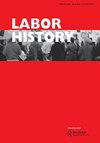“女性的声音是重要的”:性别、宣传和东线的强迫劳动,1943-1945
IF 0.7
4区 管理学
Q1 HISTORY
引用次数: 0
摘要
本文考察了二战期间德国军队在东线使用的当地女性宣传员的作用。尽管他们所做的工作符合战后的合作理念,但在暴力战争和镇压占领的背景下,宣传人员在国防军手中的经历构成了多种形式的强迫劳动。不管这些妇女为国防军工作的动机如何,她们都与占领军建立了统治和依赖的关系。虽然女性宣传员的人数远少于男性宣传员,但她们对德国高层来说尤为重要,他们认为自己的“女性”特质,如同理心和魅力,有助于国防军影响和控制以女性为主的平民人口。与此同时,他们在前线鼓励红军士兵叛逃的工作跨越了传统的性别界限。在这项任务中,女性也因其性别而受到重视,德国当局认为,在很大程度上被剥夺了女性接触的苏联士兵会特别容易接受女性声音的魅力。这种代表国防军的强迫劳动使这些妇女不仅容易受到德国的暴力,而且容易受到苏联对其合作及其相关报复的指控。本文章由计算机程序翻译,如有差异,请以英文原文为准。
‘A female voice is instrumental’: gender, propaganda, and coerced labor on the Eastern Front, 1943-1945
ABSTRACT This article examines the role of local, female propagandists utilized by the German army on the Eastern Front during WWII. Although the work they undertook aligned with postwar notions of collaboration, the propagandists’ experiences at the hands of the Wehrmacht, in a context of a violent war and repressive occupation, constitutes coerced labour in multiple forms. Regardless of the women’s motivations for working for the Wehrmacht, they entered a relationship of domination and dependence with the occupation force. While female propagandists numbered far fewer than their male counterparts, they held a particular importance for German high command who believed that their “feminine” traits, such as empathy and charm, helped the Wehrmacht influence and control the largely female civilian population. At the same time, their work on the frontlines encouraging Red Army soldiers to defect crossed traditional gender boundaries. In this task too, the women were valued for their gender with German authorities believing that Soviet soldiers, largely deprived of female contact, would be particularly receptive to the charm of a woman’s voice. Such coerced labor on behalf of the Wehrmacht rendered these women vulnerable not only to German violence, but also to Soviet accusations of collaboration and its associated reprisals.
求助全文
通过发布文献求助,成功后即可免费获取论文全文。
去求助
来源期刊

Labor History
Multiple-
CiteScore
1.00
自引率
28.60%
发文量
44
期刊介绍:
Labor History is the pre-eminent journal for historical scholarship on labor. It is thoroughly ecumenical in its approach and showcases the work of labor historians, industrial relations scholars, labor economists, political scientists, sociologists, social movement theorists, business scholars and all others who write about labor issues. Labor History is also committed to geographical and chronological breadth. It publishes work on labor in the US and all other areas of the world. It is concerned with questions of labor in every time period, from the eighteenth century to contemporary events. Labor History provides a forum for all labor scholars, thus helping to bind together a large but fragmented area of study. By embracing all disciplines, time frames and locales, Labor History is the flagship journal of the entire field. All research articles published in the journal have undergone rigorous peer review, based on initial editor screening and refereeing by at least two anonymous referees.
 求助内容:
求助内容: 应助结果提醒方式:
应助结果提醒方式:


